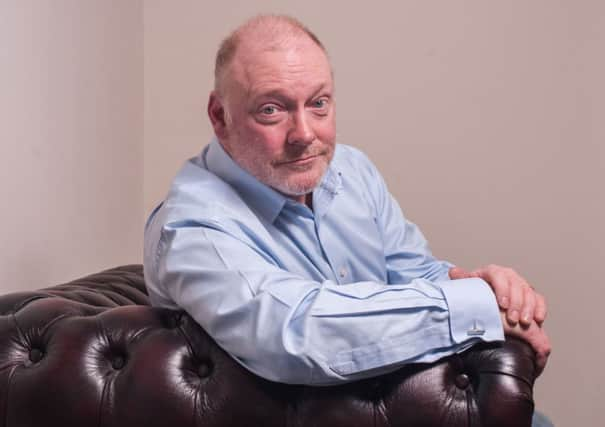Monday Interview: Marcus Noble, Quest Corporate


Following Czechoslovakia’s break-up at the start of 1993, the European Union asked Noble’s firm, Quest Corporate, to help with the roll-out of mobile telecoms across the mountainous state.
“I got asked to meet the Slovakian military guys, and it was one of the strangest meetings I’ve ever had,” he recalls now, in his offices on Edinburgh’s Walker Street, from where the Quest founding partner runs the corporate finance boutique.
Advertisement
Hide AdAdvertisement
Hide Ad“It was in an old concrete building, and about 20 of them were sitting at a long table with a communist mural behind them. On the other side was a single chair, for me. I explained I wanted local businesses to be able to use the military’s microwave network to communicate with each other, and export stuff like fruit and veg.
“They talked among themselves for half an hour, asking unrelated questions now and then, and I was sent on my way. At the close of business the next day, I was told they’d open up the network.”
The communist setting for the talks seem appropriate for Gorbals-born Noble, who admits to spending his secondary education “in a constant state of rebellion” and says that he still holds by a lot of what his younger self read in Karl Marx’s Das Kapital.
“I think the collectivisation of the means of production is probably difficult to implement given the evolutionary stage the human race is at, but there’s a lot to be said for it, and I would definitely nationalise the banks.”
He adds: “I’m still a big believer in international socialism, but we don’t have the evolutionary capacity to manage ourselves globally.”
Not the kind of talk one would expect from a corporate financier, but Noble seems to have retained the rebellious streak from his school days, perhaps as a result of being dyslexic. Talking about the condition, he says: “I’ve no idea of time, I can’t do a sequence and my spelling is awful. But my reading’s really good and I have a very good memory.
“I think dyslexia gives me an advantage in business because I can think my way around a problem before others get there.”
However, Noble’s condition meant his experience of primary school, at Holy Cross in Govanhill, was not an enjoyable one. “There were 52 kids in my class, and we got taught two things – the catechism in the morning, which I could never read or remember, then arithmetic in the afternoon, and I couldn’t count or do sequences. So my entire time there was spent getting the belt.”
Advertisement
Hide AdAdvertisement
Hide AdBut he developed a passion for technology and the self-confessed “whizz” at Fortan IV programming went on to study computing at Glasgow Tech, where he did his thesis in robotics. So it’s perhaps unsurprising that Quest has a strong focus on technology and life sciences, evidenced by its recent arrangement of a £1.5 million funding round for PureLifi, the Edinburgh University spin-out that uses beams of light to transmit data. Noble has tipped the start-up, co-founded by Harald Haas, as a candidate for an initial public offering, potentially worth “hundreds of millions of dollars”.
“I’ve been buying and selling companies since I was in my 20s, and my first was a collection of programmers set up like a workers’ co-operative,” says Noble.
Although he says Edinburgh is “the place where you just have to be” because of its network of lawyers and accountants, he insists he couldn’t live in the Scottish capital and loves his adopted Ayrshire – despite describing the drive to Edinburgh and back as “the worst commute in the UK”.
He adds: “I’m from the southside of Glasgow – my entire family is from the Gorbals. If I had to live in a city in Scotland I’d live in the west end of Glasgow; it’s nice and cosmopolitan and nobody really cares what you do.”
Quest has a strong Scottish focus, but Noble has spent much of working life in technology companies in the US and once worked with healthcare software firm IDX, which was sold to General Electric for $1.2 billion (£800m) in 2006.
“We have a terrific network on the east coast of America, and have good links in Seattle. We’ve also acted for South African firms, including Dimension Data, and German companies like Gehe, the conglomerate in Stuttgart.”
In an environment where companies on opposite sides of the planet are racing to get deals done, Noble admits that his working day often ends up as a “complete ball of confusion and chaos”, but says his PA, Ruth Mountford, keeps things organised as the stress levels rise.
But he appears to thrive on the pressure, even if that means the Quest team are in the office on Christmas Eve getting transactions on both sides of the Atlantic over the line.
Advertisement
Hide AdAdvertisement
Hide AdIt’s a small team, which also includes Scott Carnegie, Caitlin Cunningham, Andrew Hope and Stuart Mitchell, but Noble says he would not want to see it expand much further and seems unconvinced about the merits of opening a London office, although a base in the US is a possibility.
“In our line of work, once you get beyond eight or ten partners then it’s difficult to maintain that level of quality and focus. Never say never though; maybe if we get someone who’s cleverer than me we could do it.”
SUBSCRIBE TO THE SCOTSMAN’S BUSINESS BRIEFING